Finance CRM - A Full Guide on CRM for Financial Services
In the dynamic realm of the finance industry, it’s no secret that building successful and long-lasting relationships with customers is one of the key factors for sustained success. As in any other industry, building excellent client relationships is crucial, and this is where the concept of Customer Relationship Management (CRM) comes into play.
As financial institutions adapt to evolving client preferences, navigate complex regulations, and combat intense competition, CRM has emerged as a vital component in their toolkit. But what exactly is CRM in the context of the financial industry? It's a comprehensive approach that includes both a strategic commitment to developing solid client relationships and the use of specialized software to achieve these goals.
In this article, we will delve deeper into the various functions of CRM software in the financial industry, looking at how it affects client interaction and the provision of financial services.
What is a Finance CRM?
Finance CRM is a specialized software custom-tailored for the unique needs of the financial industry. Its primary mission is to help financial advisors in building, maintaining, and strengthening relationships with their customers.
This multifaceted tool incorporates an array of functions, including contact management, sales and marketing automation, customer support and service, and analytics and reporting to name a few. Through these features, financial advisors can provide personalized financial solutions, proactively anticipate clients' needs, and consistently deliver exceptional services to their clients.
In addition, financial CRM software goes beyond just relationship management. It also plays a pivotal role in compliance management by securely storing and organizing sensitive client information, ensuring that financial business meets complex regulatory standards.
To sum up, finance CRM is a trustworthy partner for maintaining financial compliance, customizing products and services to meet individual needs, and making communication more effective. Overall, its goal is to make customers happier, build trust, and encourage loyalty, which will set financial service providers up for long-term success in an extremely competitive market.
Why Do I Need a Financial Software?
In a time of intense competition, shifting client needs, and rapid digitalization, CRM is essential in the financial services industry. The facts speak for themselves: in 2021, sales of bank CRM software reached $9.5 billion, and projections indicate substantial growth, with expectations to surge to $39.2 billion by 2031, reflecting an annual growth rate of 15.7%.
Financial advisors rely on CRM systems for a variety of compelling reasons, which contribute to their success and profitability:
- Personalized customer interactions. The capability of financial CRM software to develop personalized client interactions ensures that customers are not just served, but also valued. This, in turn, develops greater satisfaction and long-lasting loyalty – critical assets in an industry where trust and reliability are paramount.
- Automated administrative tasks. CRM for financial services is a great tool for freeing financial professionals from the shackles of administrative tasks. By automating processes such as document generation or appointment scheduling, financial services CRM systems allow financial advisors to focus their energies on higher-value activities, such as client engagement.
- Seamless collaboration and communication. Financial CRM systems enable seamless teamwork, both within the organization and with customers, across various channels. This consistency and punctuality in communication are key to maintaining strong relationships and fostering trust.
- Champion of compliance. In the face of strict regulatory requirements, financial services CRM emerges as a champion of compliance. These systems securely store and manage sensitive financial information, ensuring that the business remains in line with customer data protection and reporting regulations, avoiding possible legal and reputational risks.
Which Departments Can Leverage CRM For the Financial Services Industry For Their Advantage?
CRM solutions for financial services are versatile tools applicable across multiple departments within a financial business. These systems may suit the unique processes of different organizations, whether they are banks, credit unions, insurance companies, or investment businesses, making everyday tasks simpler and improving departmental effectiveness overall.
Here, we delve into several typical departments found in almost any financial business and examine how a modern CRM software streamlines their daily tasks:
Marketing
Best CRM for financial services empowers marketing teams to generate leads more effectively and enhance brand visibility. It facilitates the creation, execution, and optimization of omnichannel marketing campaigns across diverse markets and geographies.
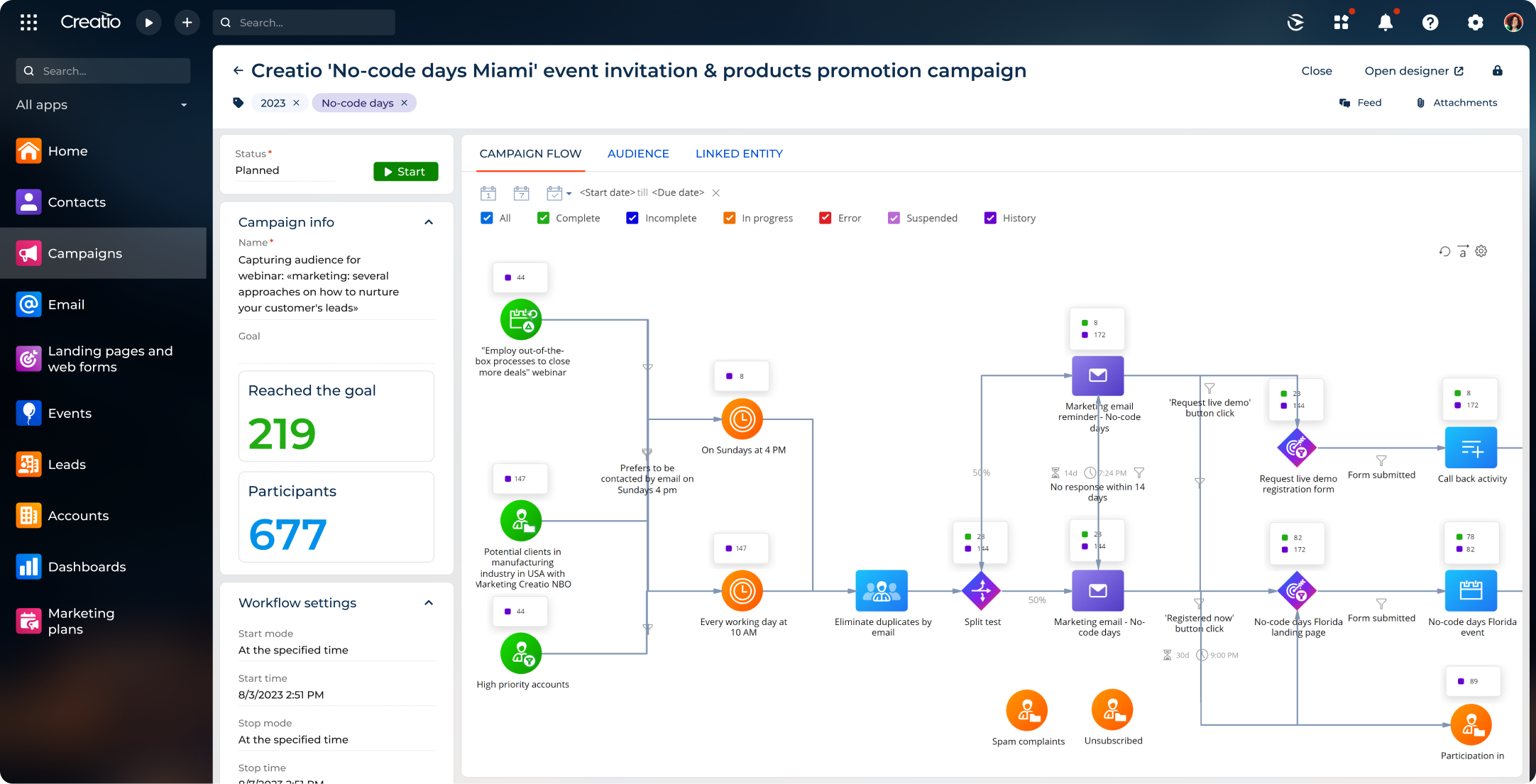
Thanks to marketing automation features, CRM for financial services helps businesses achieve efficiency and effectiveness in their marketing efforts, such as lead nurturing campaigns, email marketing, and more. By leveraging automation, marketing teams can deliver timely and targeted communications to prospects and clients, fostering relationships and guiding them through the sales funnel.
Moreover, CRM for finance provides valuable insights and analytics that enable marketers to measure the impact of their campaigns and optimize their strategies for maximum ROI. By tracking key metrics such as campaign performance, lead conversion rates, and engagement, marketers can identify trends, refine targeting strategies, and allocate resources effectively to drive business growth.
Sales
Finance CRM streamlines sales activities by providing a centralized platform for managing client interactions, leads, and opportunities. It ensures that the sales team has real-time access to customer information, including their financial profiles, investment preferences, and communication history.
This accessibility facilitates personalized engagement with prospects and clients, enabling sales representatives to tailor their pitches and recommendations based on individual needs and interests.
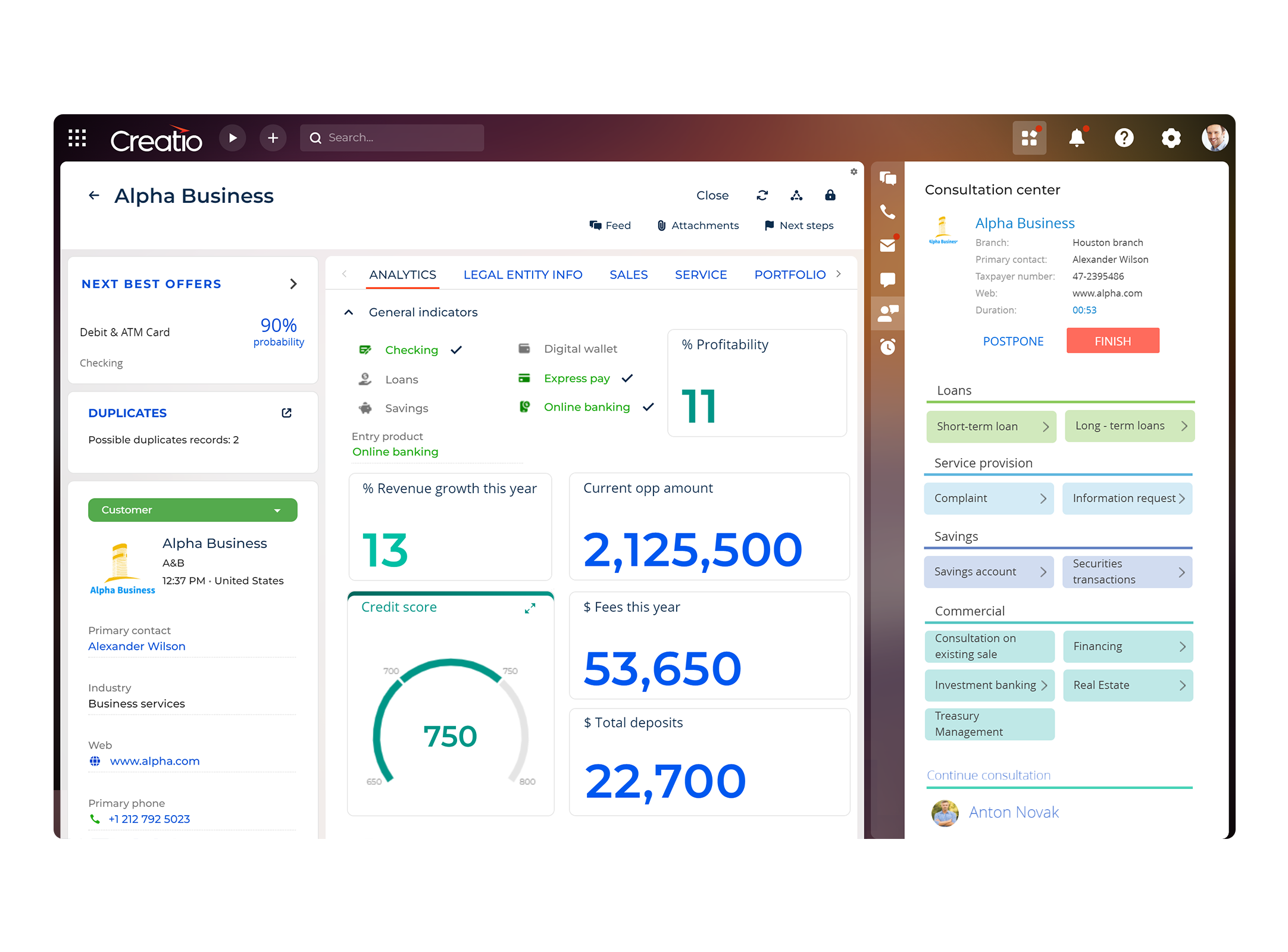
Moreover, CRM helps streamline administrative tasks associated with sales processes, such as lead management, pipeline tracking, and follow-up communications. By automating repetitive tasks and workflows, the CRM frees up valuable time for the sales team to focus on building lasting relationships and closing deals.
Customer service
CRM for financial services provides customer support representatives with a 360-degree view of the customer's information, enabling them to quickly address inquiries and resolve issues. The result is elevated client satisfaction, reduced response times, and enhanced overall service quality.
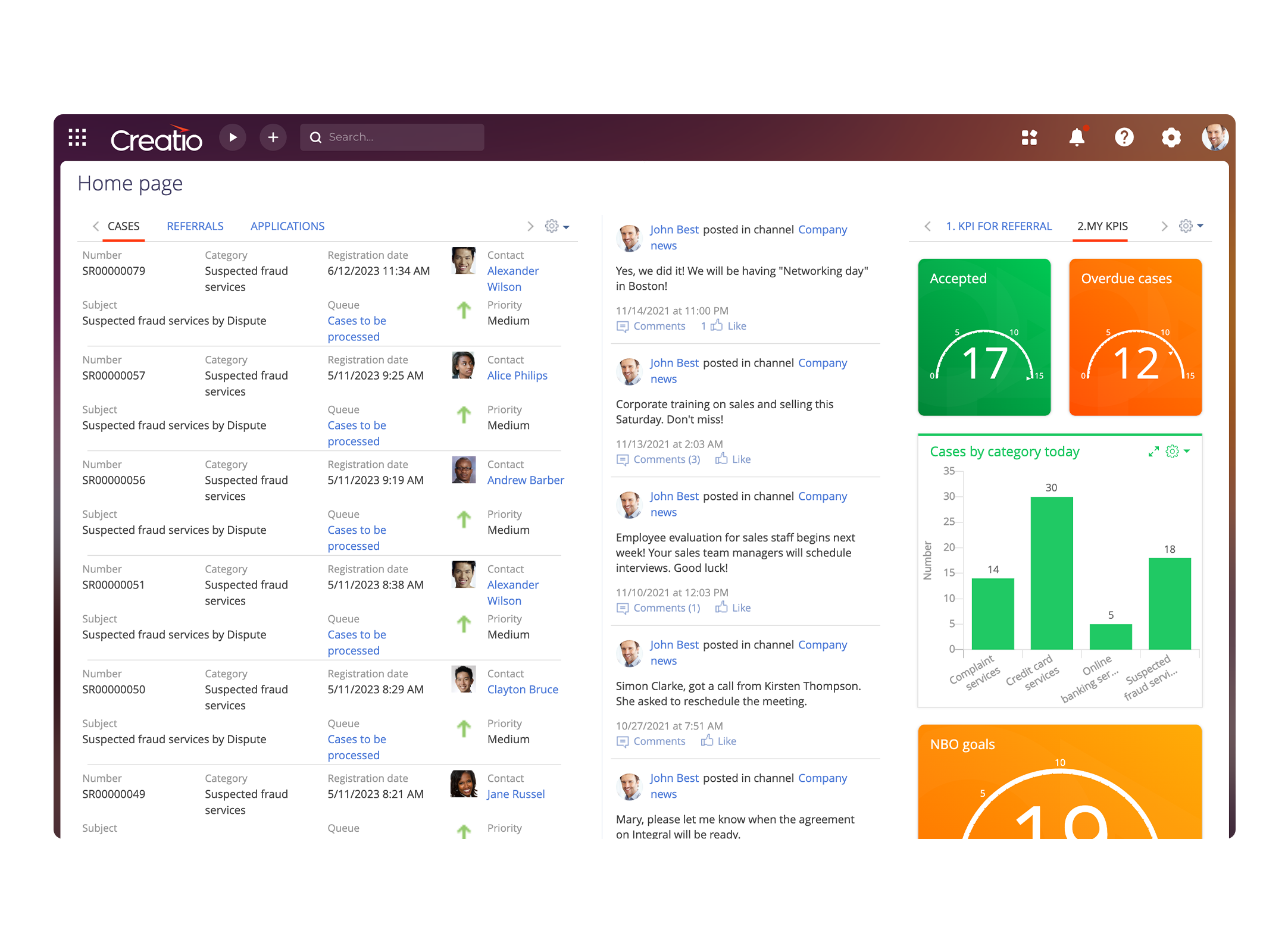
One of the key benefits of CRM is the ability to streamline communication and collaboration across departments. With CRM, consumer support representatives can easily collaborate with other teams, such as sales, marketing, and operations, to resolve complex issues and provide holistic support to customers. This ensures that clients receive consistent and coordinated assistance across all touchpoints, leading to greater satisfaction and loyalty.
Front-office
Financial CRM systems can be used by a variety of front-office roles, such as relationship managers, financial advisors, and portfolio managers, to provide personalized financial advice. These systems offer insights into client financial history and goals, facilitating informed recommendations and customer engagement.
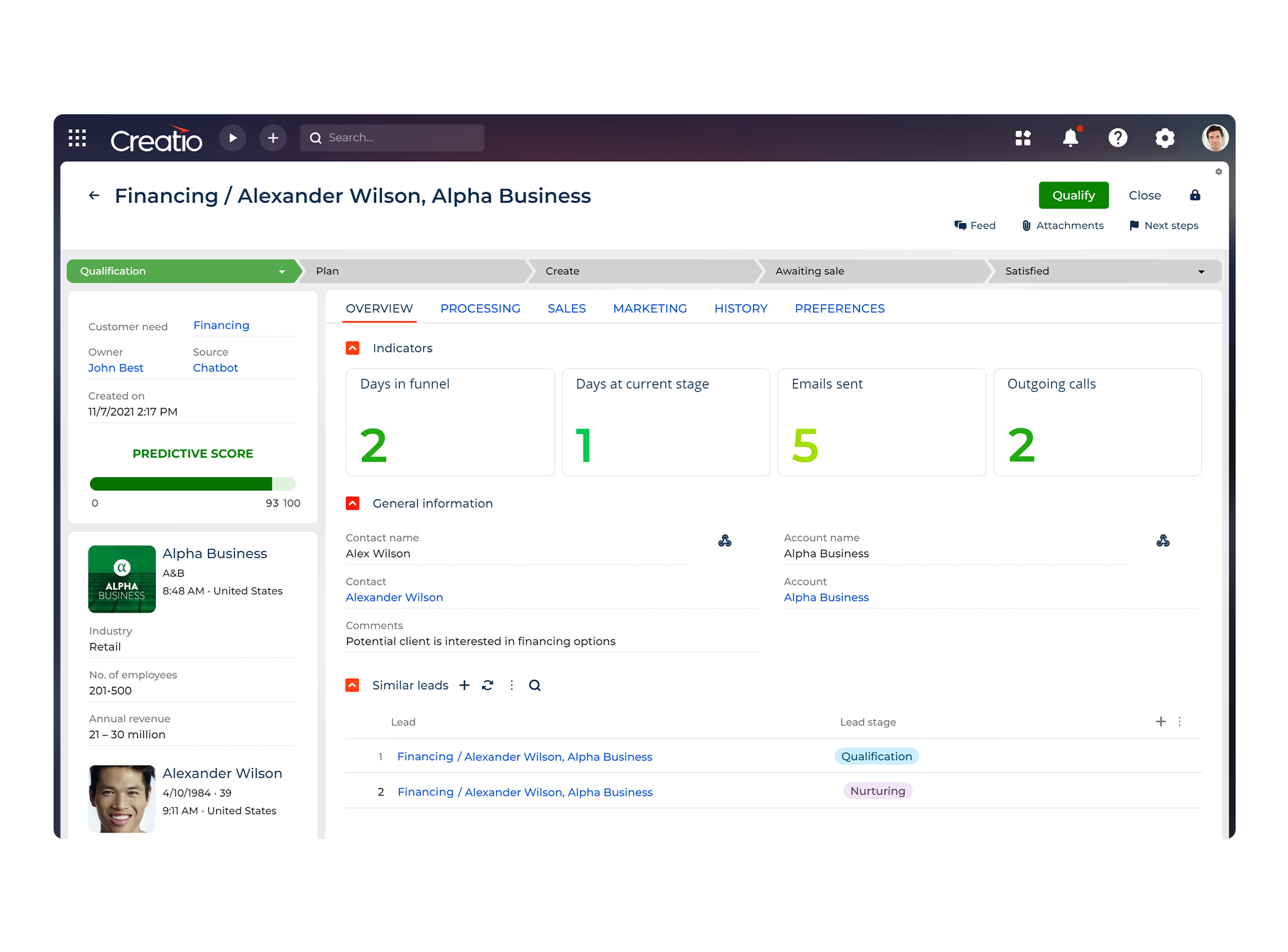
For relationship managers, CRM provides a holistic view of customer relationships, enabling them to build deeper connections and tailor their approach to meet individual client needs. Financial advisors rely on CRM systems to conduct comprehensive financial analyses, assess client risk profiles, and recommend suitable investment strategies.
Portfolio managers also benefit from the software, which enables them to monitor portfolio performance, analyze market trends, and make informed investment decisions.
Loan origination and underwriting
In lending departments, finance CRM simplifies the loan origination process, allowing for streamlined application tracking, automated workflows, and improved underwriting decisions. Financial advisor institutions can simplify the loan application process by centralizing applicant information, documents, and communications in one secure platform. This allows for seamless application tracking, ensuring that all relevant information is easily accessible to loan officers and underwriters throughout the entire lifecycle of the loan.
Furthermore, CRM facilitates workflow automation, automating routine tasks such as information entry, document verification, and application status updates. By eliminating manual processes and reducing administrative burdens, CRM accelerates the loan origination process, significantly reducing turnaround times and improving operational efficiency.
CRM also supports informed underwriting decisions. By providing comprehensive borrower profiles, credit histories, and financial data, CRM enables underwriters to conduct thorough risk assessments and make informed decisions.
Compliance and risk management
CRM systems offer secure data storage and facilitate organized management of sensitive financial information and personal client information. This helps financial advisors avoid legal and reputational issues and is crucial for compliance with regulatory standards and robust risk management.
A CRM system in a financial advisor business isn't limited to client-facing teams. It extends its utility to administrative departments like accounting, legal, HR, and others. As a result, it improves productivity and collaboration across the entire organization by facilitating data sharing and streamlining processes.
Benefits of Finance CRM
Finance CRM offers many benefits to financial advisors, enhancing their operations and customer interactions. Here are the main advantages of CRM for financial services:
Enhancing relationships with clients
Positive relationships with clients are at the heart of success in the finance industry, and CRM for finance plays a pivotal role in nurturing these connections. Centralized management of client interactions is key, as it ensures that every touchpoint, from initial contact to ongoing communication, is seamlessly tracked and managed within a single platform.
This means that financial advisors have access to a holistic view of each client's journey, including past interactions, preferences, and financial goals.
Boosting client retention
Financial CRM systems enhance customer retention by enabling personalized communication and timely follow-ups, ensuring clients feel valued and supported. They also provide insights into client behaviors and preferences, allowing financial advisors to proactively address their needs and concerns.
Increasing sales and revenue
Financial CRM systems offer the sales team a centralized platform to manage client interactions, leads, and opportunities. This promotes more personalized engagement, reduces paperwork, and improves conversion rates by streamlining sales processes, resulting in increased revenue for financial institutions. Additionally, CRM data-driven insights inform effective cross-selling and up-selling opportunities, increasing revenue from existing customers.
Enhancing operational efficiency
CRM for financial services enhances front-office processes by streamlining client interactions and enabling more personalized assistance. In the middle office, they aid in risk management and compliance tracking, ensuring accurate and timely decision-making. In the back office, CRM systems help optimize and manage administrative tasks, reducing manual labor and improving customer data management, thereby increasing the financial institution's overall operational efficiency.
Improving employee productivity and collaboration
Finance CRM improves employee productivity by automating routine tasks, such as data entry, lead allocation, document generation, and more. This reduces manual work, minimizes errors, and frees up staff to concentrate on higher-value activities, resulting in more efficient and productive work processes. It also encourages teamwork by making it easier to share data and communicate with each other, which leads to better customer support and more efficient internal processes.
Key Features of Financial CRM Software
In today's diverse market of CRM systems, selecting the best CRM for your financial institution might be challenging. Each CRM solution comes with its own set of characteristics, features, strengths, and weaknesses. Nevertheless, regardless of the specific CRM you opt for, several fundamental features are essential to add value to your financial business operations:
- Unified data management involves the centralization and organization of client data, including financial history, preferences, interactions, and important documents. By having a holistic view of customer information, you can better understand individual client needs and offer more personalized experience.
- Marketing and sales automation streamlines marketing campaigns, lead generation, and sales opportunity management. These features ensure that prospects are effectively converted into loyal customers, enhancing revenue streams and the return on marketing investments.
- Client service and support involves case management, support ticketing, and efficient query resolution, ensuring customers receive timely and effective assistance.
- Workflow automation simplifies various front-office, middle-office, and back-office processes, including customer onboarding, loan management, verification, underwriting, and more. By automating these workflows, the CRM system accelerates decision-making, reduces manual effort, and enhances operational efficiency.
- AI and machine learning tools assist in analyzing data, identifying trends, and making predictions. They enable financial professionals to make informed decisions and provide more tailored financial solutions to customers.
- Integrated omnichannel communications ensure that customers can interact with your organization in the manner most convenient for them.
- Document management provides centralized document storage and retrieval, making it easy to access client records, financial forms, and other essential documents.
- Analytics and reporting tools offer valuable insights into client behavior, performance metrics, and the effectiveness of marketing and sales strategies. These analytics features enable financial advisors to make data-driven decisions, adapt their approaches, and continuously improve their services.
Choosing the Right Finance CRM: Factors to Evaluate
Choosing the right financial software is a critical decision for financial advisors. To make the best choice, consider the following key factors:
Identify your requirements
Before selecting CRM for financial advisors, it's essential to identify your organization's specific requirements and objectives. Perform a comprehensive review of your current workflows, pain points, and future development plans to determine the features and functionalities that are most critical for your business.
Consider factors such as the size of your client base, the complexity of your financial products or services, and regulatory compliance needs. Engage key stakeholders across departments to gather information and ensure alignment with organizational goals. By clearly defining your requirements upfront, you can narrow down your options and focus on choosing a CRM that best meets your unique needs.
Scope of features
When evaluating CRM options for the finance industry, it's crucial to consider a comprehensive set of features tailored to your specific needs. Look for CRMs that offer features mentioned in the previous part of the article as well as robust contact management, analytics, marketing automation capabilities, etc.
Customizability
Customization is crucial to adapt the CRM to your unique processes. Look for a system that provides no-code tools, enabling you to tailor the CRM to your specific workflows without the need for extensive coding experience or IT resources.
User adoption
The CRM for financial services should offer comprehensive training materials and lessons to facilitate staff adoption. Additionally, 24/7 customer support ensures that you have assistance when needed, especially in urgent situations.
Ease of use
A modern, user-friendly user interface (UI) is essential for staff efficiency. The CRM should feature an intuitive design that allows employees to easily navigate and have quick access to necessary tools, reducing the learning curve and enhancing productivity.
Seamless integration
Integration capabilities are vital for a financial CRM, allowing seamless connectivity with other essential tools and systems used within your business. Look for CRMs that offer easy integration with accounting software, financial planning tools, and document management systems to streamline data exchange and eliminate manual processes.
Integration with accounting software and portfolio management capabilities is essential for wealth management firms, investment advisors, and financial organizations, enabling seamless client portfolio tracking and generating financial reports. Furthermore, integration with third-party financial data providers enhances decision-making by providing real-time insights for investment analysis and risk management.
Security
Financial data is overly sensitive, so robust security and data governance measures are non-negotiable. The chosen CRM tools must comply with industry-specific data security and privacy regulations, such as GDPR or CCPA. It should include encryption, access controls, and data protection features to safeguard clients' information.
Scalability
Consider the long-term scalability of the CRM system. It should be flexible and adaptable to accommodate changes in your organization’s size, data volume, and additional features as your business grows.
Openness
CRMs for finance should prioritize open architecture or provide open APIs, allowing seamless integration with various financial and non-financial applications. This openness ensures a cohesive ecosystem that leverages the full spectrum of tools and data, enhancing operational efficiency and customer service.
Pricing
Pricing is an important factor when choosing the best CRM for your business, especially if you're on a budget. Focus on finding apps that offer flexible pricing plans tailored to your specific needs. Look for options that align with the requirements of your business, ensuring that you get the most value for your investment.
Additionally, consider CRM providers that offer transparent pricing structures with no hidden fees, allowing you to predict costs accurately.
Top 6 Financial CRM Solutions
Creatio
Creatio offers the best CRM for finance - Financial Services Creatio, a no-code platform to automate to automate financial services processes and CRM with a maximum degree of freedom. It empowers retail and business banks, along with other financial service institutions, to orchestrate holistic client journeys and optimize operations across the front, middle, and back offices.
With Financial Services Creatio, organizations can deliver highly personalized customer experiences, elevate their up- and cross-selling success, execute seamless workflows, significantly accelerate the launch of new financial products, centralize data and applications, drive rapid innovation through no-code empowerment for business users, and establish a robust alignment between business and IT teams.
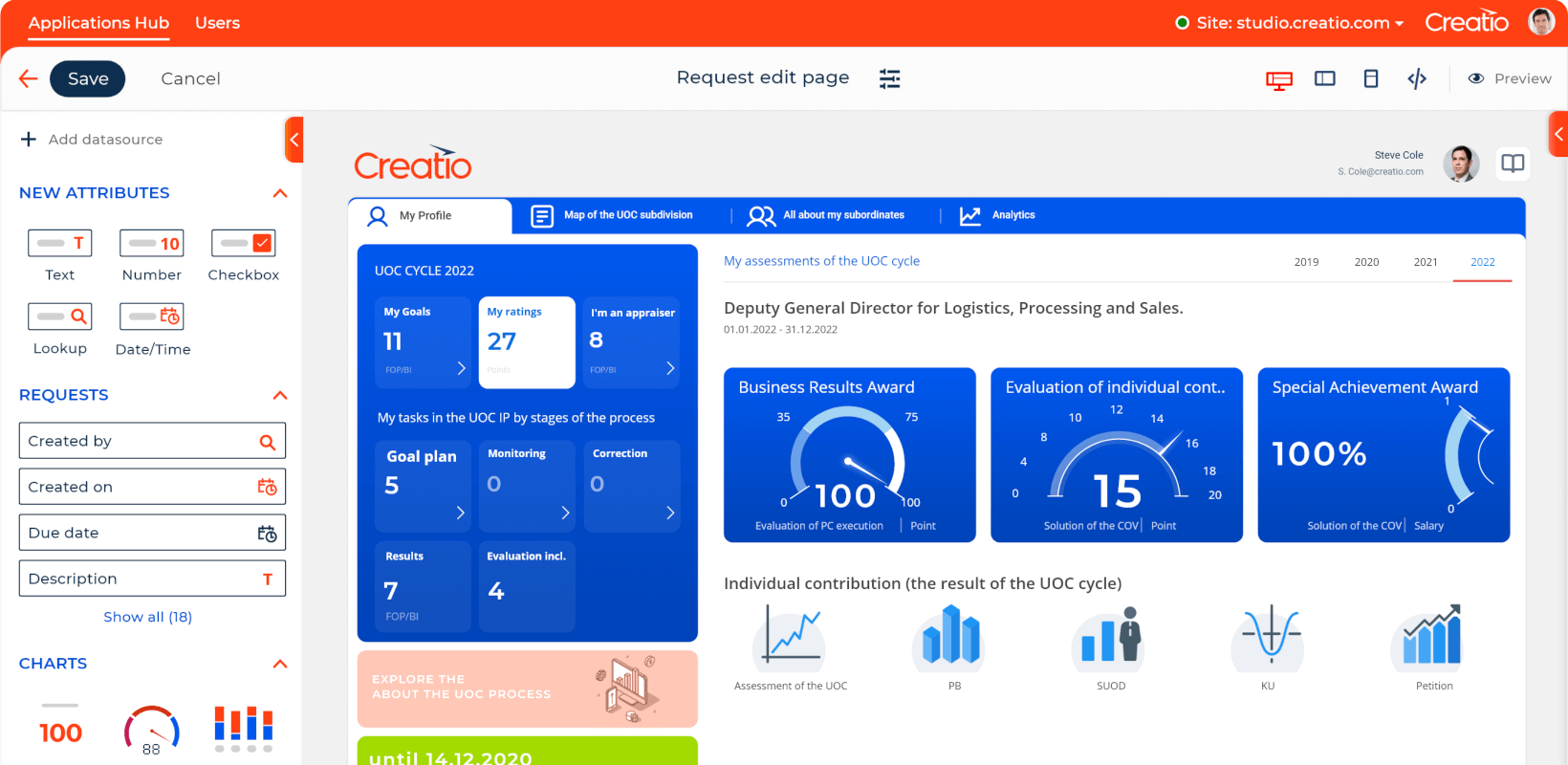
Here are a few instances of CRM tasks and internal operational processes that can be enhanced through Financial Services Creatio:
- Customer 360: access a complete and integrated view of each client to enhance personalization, improve interactions, and build strong client relationships.
- Marketing: boost demand generation through multichannel marketing campaigns across various markets and regions; engage your audience by delivering tailored offers through the right channels at precisely the right moment.
- Sales: efficiently handle sales opportunities using workflow automation; enhance client engagement with personalized value propositions driven by predictive scoring and AI/ML-powered next-best-offer insights.
- Onboarding: deliver personalized onboarding experiences by leveraging a comprehensive 360-degree view of clients, needs analysis, streamlined offer management, and an automated product catalog.
- Account opening: automate account opening procedures, streamline screening and verification processes, accelerate approvals, and digitize document management to eliminate errors and enhance customer satisfaction.
- Customer experience: enhance clients' experience through prompt response to inquiries, effective issue resolution, and the delivery of tailored services.
- Lending: streamline loan origination, underwriting, and approval processes using automated digital workflows and a consolidated customer 360-degree data view.
- Compliance management: ensure compliance, mitigate risks, and fulfill regulatory obligations through consolidated data management, reporting, and automation tools.
- No-code customization: tailor your CRM to align with the organization's unique requirements and regulatory standards, all without requiring the expertise of IT specialists or programmers.

Salesforce
Salesforce Financial Services Cloud is a specialized CRM platform designed for the financial services industry. It offers a comprehensive suite of tools and features tailored to the unique needs of banks, insurance companies, wealth management firms, and other financial institutions.
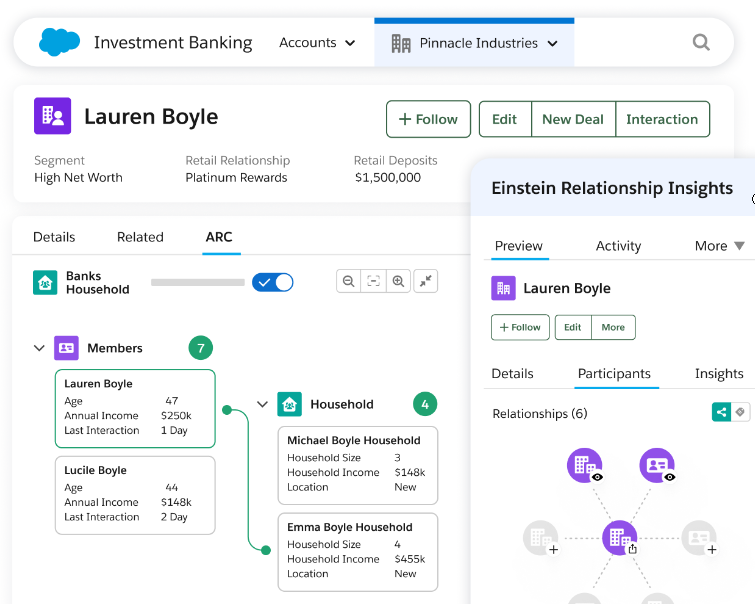
Financial Services Cloud enables financial professionals to better understand their clients, personalize interactions, and streamline processes across various departments. It provides tools for lead management, customer onboarding, financial planning, and regulatory compliance.
With its data-driven insights and seamless integration with other Salesforce products, Financial Services Cloud helps financial organizations enhance customer relationships, drive growth, and ensure compliance.
Microsoft
Microsoft Cloud for Financial Services is an all-in-one suite of integrated solutions, featuring Microsoft Azure, Microsoft 365, Dynamics 365, Microsoft Teams, and Power Platform, tailored to meet the unique demands of the financial industry. It equips financial advisors to manage vast volumes of financial data efficiently, enabling the delivery of exceptional experiences, empowering staff, and combatting financial crime.
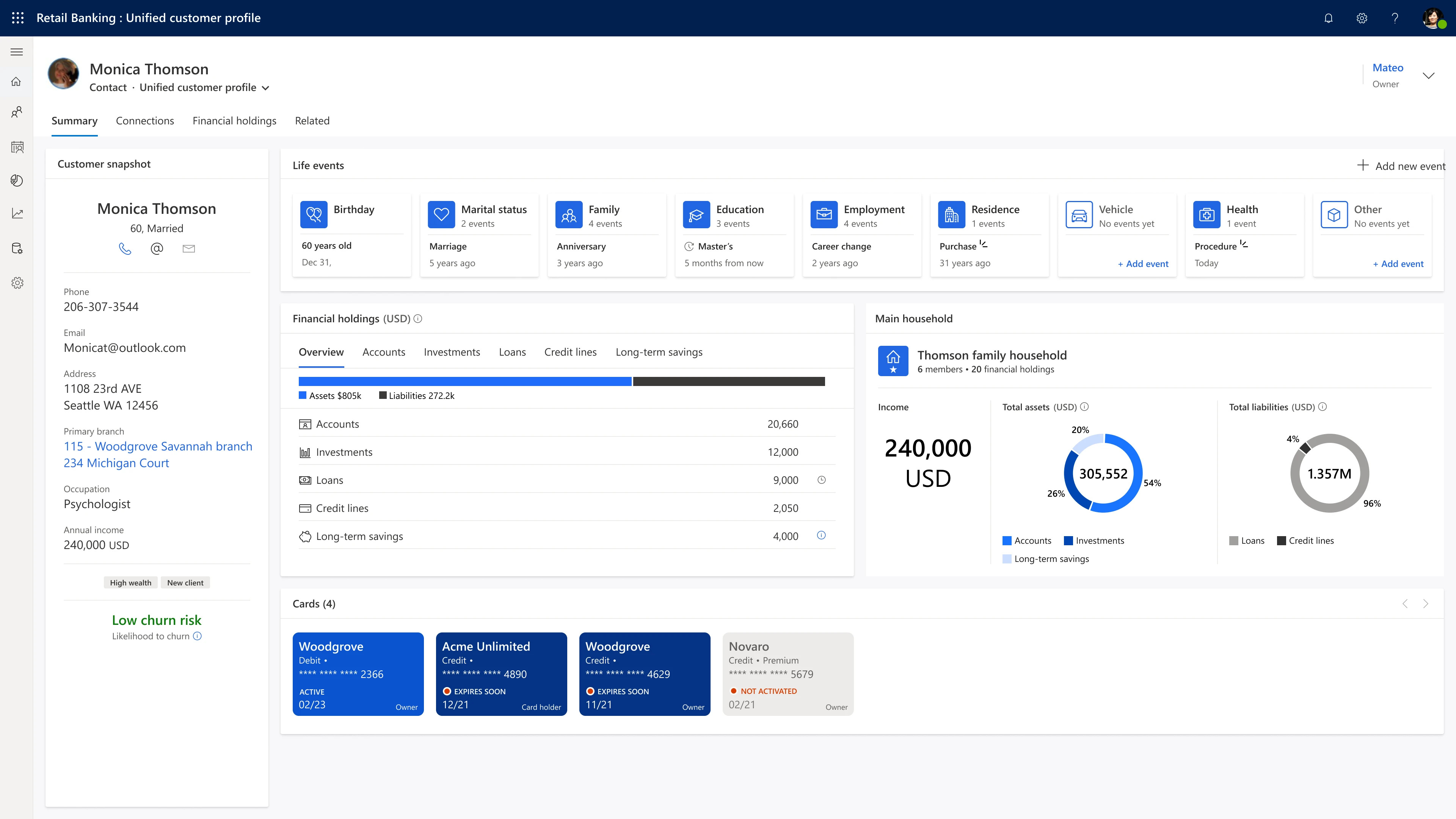
This cloud-based solution also prioritizes security, compliance, and seamless integration. By enhancing collaboration, automation, and insights, it optimizes operations, personalizes customer interactions, improves overall customer experiences, and offers valuable data insights.
This industry-specific cloud harnesses the potential of Microsoft's existing and new capabilities, promoting responsible and sustainable growth, further enhanced by a robust partner ecosystem.
Oracle
Oracle CX for Financial Services empowers financial advisors to transform their operations and transition to a digital client experience. Offering a comprehensive 360-degree view of customer data and interactions, financial organizations can establish personalized relationships with each customer, providing tailored financial solutions to meet their specific requirements.
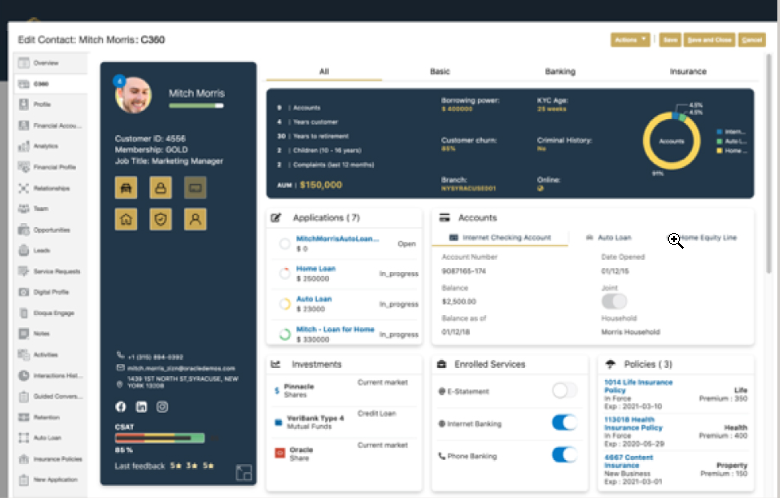
Automation enables the seamless identification, nurturing, and generation of referrals for cross-selling products across various channels, including social, mobile, and web. The Needs Analysis feature allows you to offer guided selling and self-service personalized product recommendations, streamlining customer onboarding and account origination processes, further enhancing the customer experience.
HubSpot
HubSpot CRM is a versatile customer relationship management solution encompassing tools for marketing, sales, services, operations, and content management. While it doesn't provide a specialized solution tailored explicitly for financial services, it can be adapted to support certain financial advisors' needs.
This unified platform enables financial professionals to organize, track, and nurture client interactions effectively, enhancing customer relationships. HubSpot CRM also provides analytics and reporting features for data-driven decision-making.
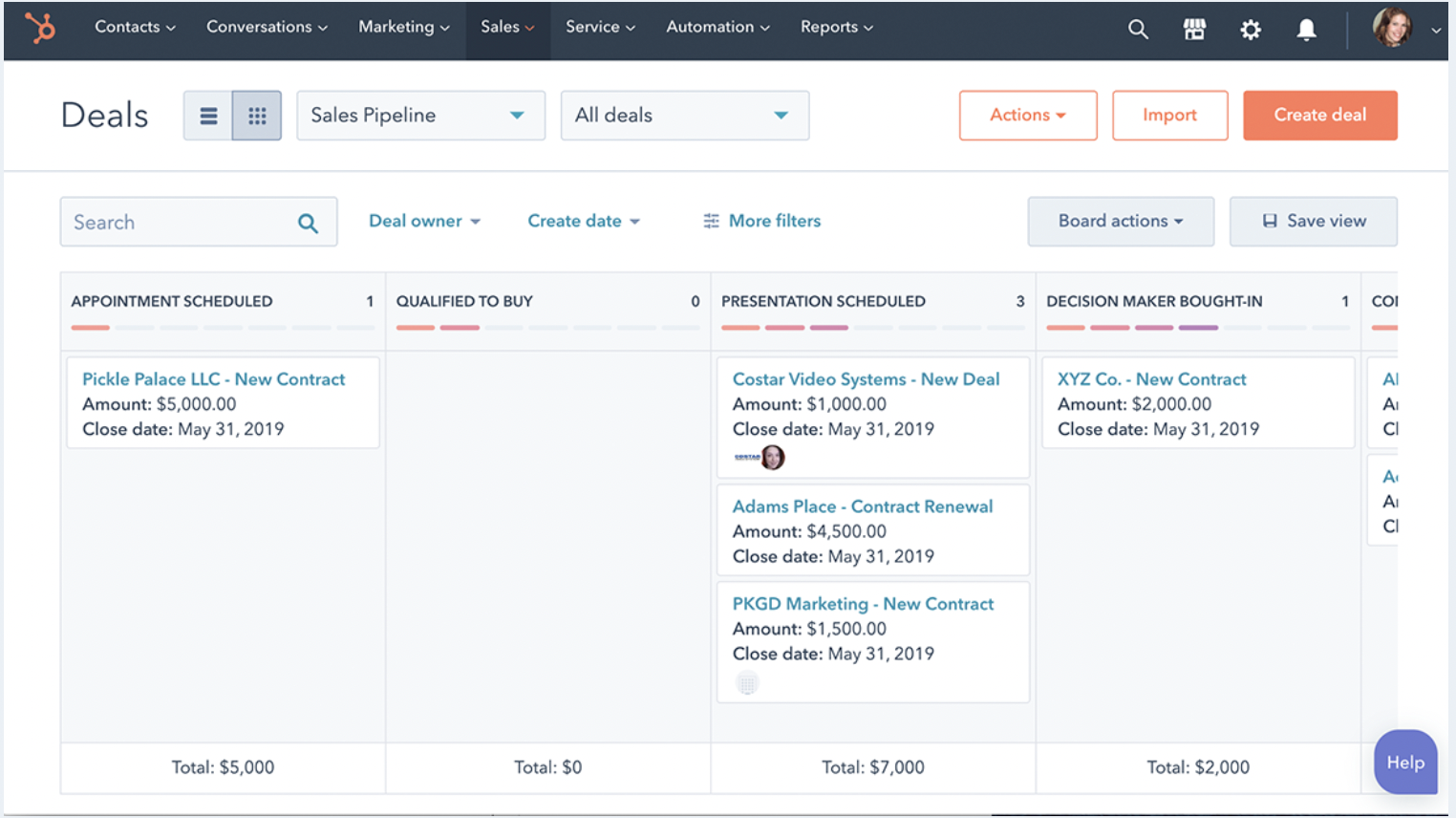
It facilitates compliance management and integrates seamlessly with other HubSpot tools, streamlining data sharing and communication across the institution. With a user-friendly interface and scalability, HubSpot CRM empowers financial organizations to deliver personalized experiences and drive growth.
BUSINESSNEXT
BUSINESSNEXT is a CRM suite tailored for financial advisors. It implements its vision of bringing about autonomous banking through a composable set of platforms, such as CRMNEXT, DATANEXT, CUSTOMERNEXT, and 12+ pre-assembled products.
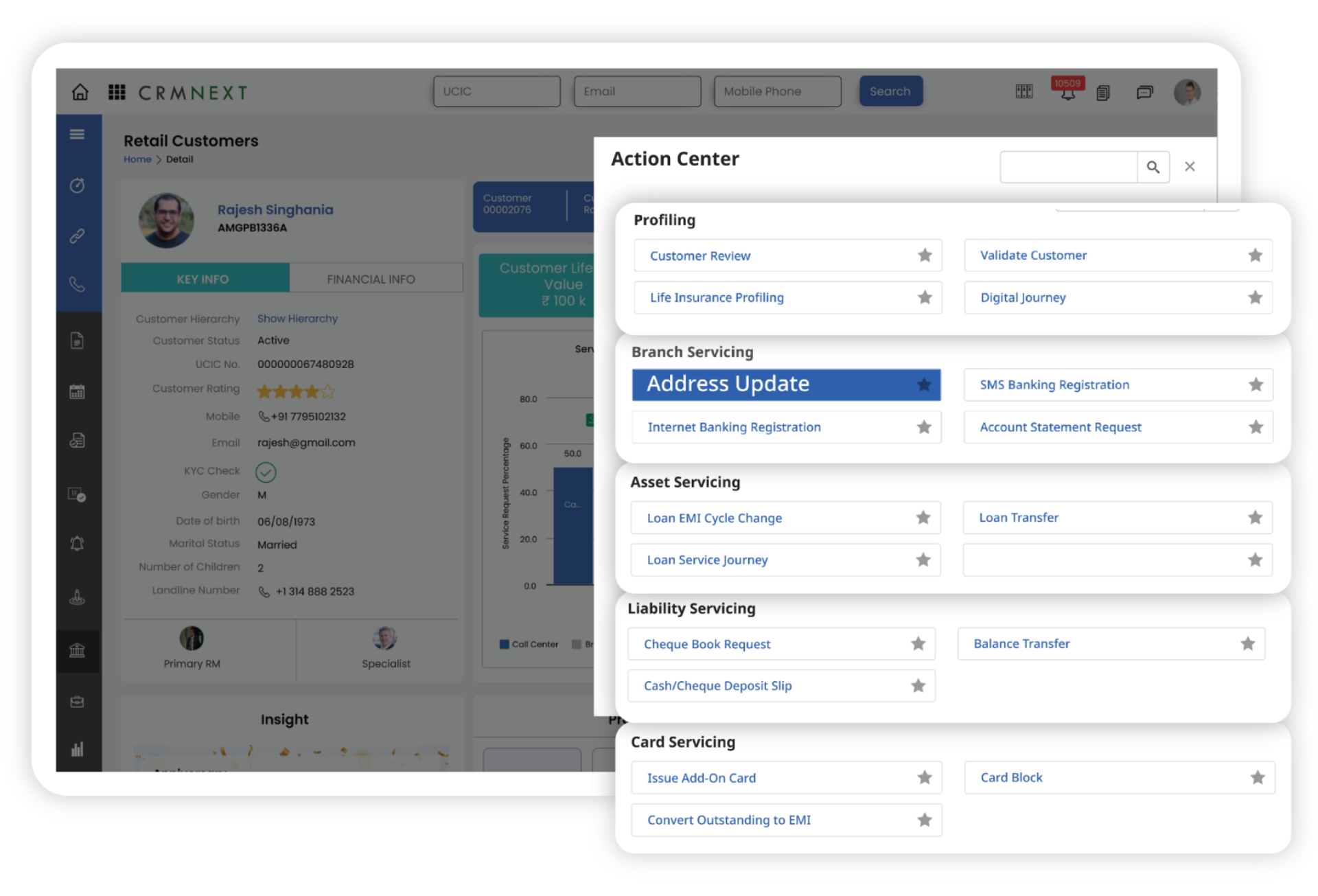
BUSINESSNEXT empowers businesses to undertake a transformative journey toward true autonomous banking, providing a holistic experience for users, customers, and partners. It leverages full-stack big data and AI capabilities, enabling businesses to reassemble, rearrange, and reorient their tech components through the shape-shifting architecture called “Fybre”. This delivers hyper scalability, cloud-native configurations, and observability, driving a transformation toward complete autonomous banking.
FAQ
What is finance CRM?
Finance CRM, or Financial Customer Relationship Management, is a specialized software solution designed for the financial services industry. It helps financial advisors manage customer interactions, streamline operations, ensure compliance, and deliver personalized products and services.
How does Financial CRM software improve customer experiences?
CRM for finance provides a 360-degree view of client information, enabling personalized interactions, timely responses, and tailored financial solutions. This results in increased customer satisfaction and trust.
Which departments within financial institutions can benefit from finance CRM?
Various departments, including marketing, sales, customer service, loan origination, compliance, HR, IT, and finance, can leverage finance and CRM tools to streamline processes and enhance customer experience.
What are the key features of financial CRM software?
Key features include unified data management, marketing and sales automation, customer service support, workflow automation, AI and machine learning, omnichannel communication, document management, and analytics and reporting.
How do you choose the best CRM for your bank?
To select the best CRM for finance, consider factors like customization, user adoption, ease of use, security, scalability, and openness to ensure it aligns with your institution's specific requirements and long-term growth.





